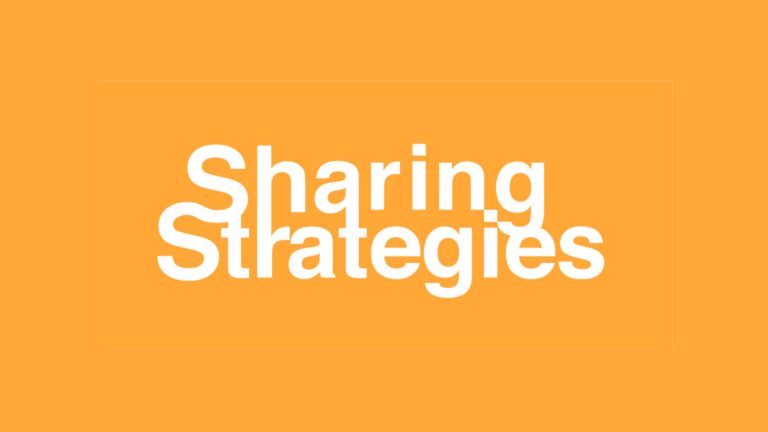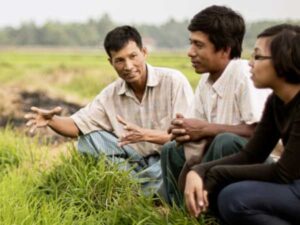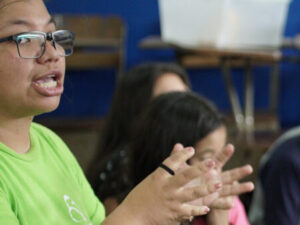Sharing Strategies brings together a diverse network of change-makers to share strategic insights and impactful opportunities to make a difference around issues related to climate, conflicts, and inequalities.
Jamie Drummond of Sharing Strategies and ONE spoke with Divya Manocha on February 6, 2024. Click here to read the full interview with insights highlighted.
Divya Manocha: Could please introduce yourself, describe the problem that you and your organization are working towards and how are you responding to it?
Jamie Drummond: I’ll primarily be talking about Sharing Strategies, but I also founded an organization called ONE, which will also come into the conversation.
Sharing Strategies is a very small, very catalytic organization. It’s a B2B [business-to-business] so it’s white label and not public facing. We’re working to do the diplomatic work between people and organizations working on climate, development, health, and nature in order to get them to share common frameworks for action, finance, data, and political leadership.
These sectors have a lot in common, but they’re talking in different ‘languages’ and have different ambitions for the same money. Instead of competing over financing, we’re working together for shared financial systems change. Sharing Strategies is expressed in three main goals:
First, we’re working to unlock the 2-3% of global GDP required to meet our 2030 goals as part of the Paris Agreement and United Nations SDGs [Sustainable Development Goals]. That is $2-3 trillion per annum that we need in order to align countries with their development and climate goals. Details of those numbers can be found in Songwe Stern’s High-Level Expert Group on Climate Finance paper that was launched in Dubai as part of COP28 [28th United Nations Conference of Parties] in 2023.
We can find that money through the World Bank and the IMF [The International Monetary Fund] through debt reprofiling and some cancellation, alongside some innovative taxation and fiscal reforms — such as eliminating fossil fuel subsidies.
Second, we’re advocating to invest that money towards transformative outcomes, managing increased finance in such a way as it works with both people and planet. Again, this is about trying to get the climate, development, and nature people to cooperate. Currently, they are pulling in slightly different directions, so we have to develop a pipeline of projects and policy frameworks that work for both people and planet, i.e., reducing hunger and poverty at the same time as reducing carbon and biodiversity loss.
These things are talked about a lot, but they’re quite hard to do. We need deliberate planning procedures — shared data sets, shared digital delivery platforms — where all the siloed approaches need to be brought under one house so that these different approaches can become interoperable then increasingly a singular way of managing a pipeline of projects through shared policy frameworks. That involves supporting a lot of country-owned platforms that engage citizens and local actors on how money will be invested.
Third, we’re working with a new generation of political leadership. Transformation isn’t going to happen just through sharing technocratic best practices. Cultural change campaigns need investment from philanthropy to become more professional and more inspired. They need to see that there’s a clear ROI [return on investment] in creative cultural campaigns just as they do when investing in technology or vaccines. We need them to invest in mechanisms that get people to contact their politicians at key moments in the political process.
We’re trying to get a lot of different people — from the north to south, public to private — to coordinate and cooperate within those three goals of Sharing Strategies. We call ourselves advocacy entrepreneurs; it’s a subcomponent of social entrepreneurship that focuses on how to change government policy and regulatory frameworks to better serve societies.
We have a long track record of achievement with ONE. Before ONE, I was the global strategist for Jubilee 2000, which campaigned to cancel the debts of the poorest countries by the year 2000. We came up with a slogan called ‘Drop the Debt’ and got lots of people from the entertainment and creative industries to support a policy campaign around debt cancellation. We also got faith leaders as well as people from both the right- and left-wing politics in the USA and Europe to support us. We built a very broad coalition and got $110 billion of mainly African debt canceled between 2000-2005.
We also helped with campaigns on HIV/AIDS to procure and reduce the prices of antiretroviral drugs; that success became the Global Fund for AIDS, TB and Malaria and the President’s Emergency Plan for AIDS Relief [PEPFAR]. Through that campaign, we provided antiretrovirals to about 37 million people and have saved a lot of lives.
Big, big, big outcomes have been achieved through a strategic approach of encouraging partners to adopt shared strategies.
Divya Manocha: What makes your approach distinctive?
Jamie Drummond: We have an approach called the six P’s that might be most familiar to those working in the area of public policy advocacy. Basically, there’s the inside and the outside.
Inside is the world of advisors to presidents, financial ministers, policy makers; they collect information on popular public viewpoints and analyze what can be done within an election cycle.
Outside is the public. As advocates, we also need to understand how to change or influence public opinion; how to organize people to contact politicians during key moments in that political process to create pressures that change policies.
These two spaces exist in a continuum; there’s no sharp dividing line because at the end of the day, a good politician has to be good at both the inside and the outside. Meanwhile, campaigners also have to understand this continuum if they want to have an impact. It’s important for advocates to understand both processes.
There’s a lot of campaigns with superficial impact — i.e., positive media support and large social media following — but without an inside strategy, campaigners can’t convert the heat generated into actual policy change. You need discipline in both the inside and the outside.
Starting from the inside, the six P’s are (1) policy (2) non-partisan political strategies (3) public pressure (4) public communication (5) popular culture (6) projects & partnerships.
Policies need to be evidence-based, and political strategies are non-partisan. Public pressure relates to getting people to contact politicians at key moments in the political process.
Public communications is about developing strategic communication approaches that influence the media and journalists to highlight certain topics to shape what politicians think is important. Meanwhile, popular culture is a slightly more long-term zeitgeist narrative. These shape mainstream public debate.
Projects and partnerships are core operational skills that often get missed; sound project management and partnership management is often forgotten.
These six P’s describe what we used for the Jubilee 2000, STOPAIDS, and Making Poverty History campaigns, which resulted in a lot of big money and big policy change for international development and global health over the last 20-25 years. Now, I’m trying to apply and adapt those six P’s to the joint challenge of climate development and nature.
Divya Manocha: How do you measure success and what evidence do you look at to ensure that you’re making progress?
Jamie Drummond: In advocacy, it’s extremely difficult to prove to your funders that all of the six P’s are needed. Often, they’re comfortable funding one of them — particularly things like funding think tanks to produce reports — and it’s harder to convince them that we need to also hire local organizers, press release writers, social media managers, zeitgeist public relations, and others. All I can really do is point to decades of achievements using the six P’s over time, and the evidence of policy change that’s occurred.
We have an approximation on ROI for the $200-300 million that was spent on global health advocacy through the Global Fund, PEPFAR, and GAVI [Global Alliance of Vaccines and Immunizations]. Over that same two decades, that investment has resulted in an additional hundred of billions of dollars by the United States, Europe, and the UK which has saved tens of millions of lives.
That’s a fairly sound ROI, but you have to believe the causality between arranging meetings with faith leaders and key districts appropriators and authorizers. You also have to believe that the combination of good report writing, good media work, good public relations campaigns, and good organizing with common sense massaging around action on AIDS/debt/climate is how overall policy change was achieved.
Our challenge is to convince philanthropists that all six P’s are necessary because it’s cheaper and easier for them to just pick one. For example, if you just invest in think tanks to produce policy reports, you won’t get the political traction or public support. It’s good for idea generation and policy origination, but not for public activation to engage in the political process. We need all six P’s.
Divya Manocha: What advice would you give to someone who wants to replicate the level of impact that you’ve created through Sharing Strategies?
Jamie Drummond: The single most important thing is to recognize the importance of the inside and outside game together, and to own that nexus of inside and outside. A lot of people prefer being on one side, but the ability to make change really happens when people understand the importance of making themselves skillful and entrepreneurial at both things at the same time.
If you want change to happen, it’s your moral responsibility to be good at both. Frankly, a lot of people I’ve worked with prefer being on the outside because it’s easier. You can be morally self-righteous. It’s easier to criticize people in power without having to roll up your sleeves, get your hands dirty with the reality of making policy happen.
There’s a premium on people who have the moral maturity to realize that you need to engage with both the inside and the outside. Familiarizing yourself with the six P’s and becoming an entrepreneur within that nexus will allow far more change to happen and far more quickly.
Divya Manocha: Can you describe something that you’ve tried that did not work as you thought and an important lesson that you learned from not succeeding?
Jamie Drummond: I wouldn’t go so far as to say it’s fully failed, but something that has been very slow has been our work on transparency and accountability in the extractives and natural resource sector.
Looking back ten to fifteen years, there was a commodity super cycle with a lot of developing and emerging economies making a lot of money from exporting raw materials. Unfortunately, many of them — especially in Africa — did not go up the value chain. This was especially true in fossil fuel. Corruption and state capture often comes with these discoveries unless you have excellent protective legislative oversight as well as checks and balances in place. There’s a huge effort to try and develop those institutions in countries like Ghana, Senegal, Kenya and Nigeria. Nigeria is, in some ways, already damaged, but there are still efforts to try to make it better, or less bad, in terms of fossil fuel corruption.
It’s an area many of us spend a lot of time on, but so far the entrepreneurialism of organized crime and corruption exceeds the entrepreneurialism of the people who care about transparency, accountability and good governance. It’s a profound challenge for everyone who not only cares about the fight against corruption, but also the fight for democracy.
The climate community needs to understand that the biggest threat caused by the fossil fuel sector is corruption, even more than carbon. For example, Putin is a kleptocrat who lives off the largest wholly-owned, essentially state-owned fossil fuel sector. That’s what funds him to do all these terrible things. Similarly, it funds various bad actors on the international stage; it enables small Gulf States to exert dangerous influence in parts of Africa. For example, the Emirates funding the Janjaweed — or what used to be called the Janjaweed — in the current ethnic cleansing and genocide in Dafur, Sudan.
We need to pay far more attention to the corruption emissions of the fossil fuel sectors. A lot of effort has been leveled on this subject over the decades, but we’ve had relatively little impact on it. I’d love to understand fully how it is that we did not succeed better, and I think it’s because we’re simply not well-funded enough. We need to understand that these organized crimes are an organized entrepreneurial enemy of good governance.
Divya Manocha: Are there any specific insights or ways of thinking that you’d like to share with other partners or actors, to advance systems level change?
Jamie Drummond: We have a historical opportunity this year and the next with Brazil as the Chair of G20 [Group of 20] and COP29. It also coincides with the 80th anniversary of the Bretton Woods Institutions of when the IMF, Work Bank, etc., were designed and built towards the end of World War II in 1944.
Today, we have to redesign those institutions — reform, replenish, and recapitalize them — in a very vast order to unlock the money I mentioned earlier. We need brilliant policy making and political leadership in the next year or two to coincide with Luna’s residency and sharing, but also the other nodes of leadership.
South Africa has the G20 the next year, so hopefully there’ll be more enlightened leadership on these issues especially with a few key G7 countries and the AU [African Union] having a seat at the G20 table. That’s a very significant development. The African Union needs to get organized to make the most of its voice and platform in conversations about systems reform.
We need to make our financial systems entrepreneurial and of the twenty-first century. Now is the time for that, and we need lots of nodes of leadership to come together over this next year to make it happen.
We have the spring meetings of the IMF and the World Bank just a week after the Skoll World Forum. We also have the Italian G7, the Brazilian G20, and then the IMF and World Bank autumn meetings. These are the kinds of key moments that we need to make change happen.
Divya Manocha: How do you see your work evolving over the next five years?
Jamie Drummond: Next year, a series of countries are going to be hitting debt lifts, i.e., they have significant bonds to repay. How these countries in debt distress reprofile and restructure their debts to enjoy longer term maturities at lower interests will be an extremely important focus area of work. There’s a lot of promise for a real model of positive change if we get it right. But if we get it wrong, these countries’ debt distress could endanger democracy even further which will certainly imperil the climate and create setbacks in human development.
Given what’s happening for the next two years, I’m hoping that we will see some systemic reform followed by some significant financial delivery and scaled investment between now and 2030.
As I said in the beginning, by 2030, we need an additional $2-3 trillion per annum to go into sustainable infrastructure as well as investments in natural and human capital with very clear KPIs linked to the SDGs and Paris Agreement goals. That’s a very exciting agenda for everyone at the Skoll World Forum Network. A lot of people in that network will hopefully be enjoying investment that is unlocked by this financial system reform in order to embody all these different projects and innovative approaches, especially amongst the local actors. In the past, we’ve been stuck at the country level; by innovating in ways that unlocks money, they’d be able to access new global resources that get down to the sub-national, district, and local actor levels.
Click here to read the full interview with insights highlighted.
Divya Manocha has been a LEDE Fellow with the Solutions Journalism Network and is the founder of SoJourn, a bootcamp that brings together university students from around the world to produce solutions journalism. SoJourn has led to the publication of several stories which now feature on the Solutions Story Tracker alongside the work of Pulitzer Prize-winning journalists. Divya’s current work focuses on making assistive technology more accessible and using the power of play to drive civic engagement.
* This interview has been edited and condensed.







